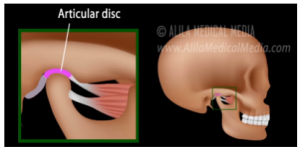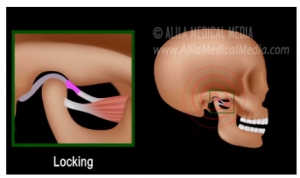The joint that connects your lower jaw to your skull is the most used joint in the body. It’s called the temporomandibular joint and this hinge lets you move your jaw up and down so you can talk, chew, and yawn. Pain and immobility in this area are called Temporomandibular Joint Disorder or TMD, and it currently affects at least 12% of the U.S. population, according to the TMJ Association.
When working properly, the temporomandibular joint allows the articular disc to slide between the condyle socket and the temporal bone to widen the mouth for a yawn or to chew. The TMJ is essentially a ball-and-socket joint, like the hip or shoulder. The two most common disorders for TMD occur when the articular disc (shown below in purple), becomes displaced or locked.
(Normal temporomandibular joint when the mouth is closed.)
(Photo of TMJ with disc displacement)
(Photo of TMJ with locking)
Symptoms, Causes, and Prevention
Many believe TMD is most likely to develop to people who grind their teeth or clench their jaw often. However, science has not pinned down one specific cause of this condition. Other causes could include an injury to the jaw, arthritis, and poor posture. Surprisingly, TMD affects women more than men but the reason why is still unclear.
Obvious symptoms of TMD include pain when moving the jaw and difficulty opening the mouth widely. Those affected may also hear unusual popping, clicking, or even grinding while using the mouth. This is caused by shifting of the articular disk inside the TMJ.
TMD Can Be Improved with Neuromuscular Massage
At Myopress Ephraim works to restore TMD within his clients using neuromuscular therapy and his strong understanding of the underlying muscular and neurological considerations around the TMJ. The temporomandibular joint is a complex set of muscles, nerves, and bones that enable the mouth to move. If it becomes misaligned, the muscles spasm leading to tension, pressure and overactive nerves. When a person is under tremendous amounts of stress jaw muscles and the surrounding areas tighten and become irritated when the jaw is clenched.
Ephraim addresses these issues by first taking an assessment of the client’s jaw muscle activity to determine the extent of the problem. These preliminary tests allow Ephraim to establish jaw tracking and check asymmetry to better treat their specific needs. Once this is done, Ephraim looks for trigger points, or balls of knotted muscles, near the TMJ that could be contributing to its pain. He then uses his hands to apply precise pressure to the trigger points to help relieve tension and return muscles to a relaxed state.

Myopress NMT sessions usually last one hour and involve a combination of precise pressure and movement from the client in order to get access to hard-to-reach muscles within the jaw. After having neuromuscular therapy at Myopress, Ephraim’s clients have noted decreased soreness and restoration of the mouth’s range of motion.
Conclusion
Though the clear cause of temporomandibular joint disorders is not known, the condition can be linked to a variety of factors that involve usage of the jaw. If you are experiencing this type of pain and looking for a natural way to treat TMD, schedule a free consultation with Myopress today.
Phone: (832) 523 – 2137
Locations: Cypress- 11810 Cypress North Houston Rd, Cypress, TX 77429
Bellaire – 5909 W Loop S #400F, Bellaire, TX 77401
Email: [email protected]
Schedule Your Appointment at Myopress NOW!
Myopress Inc. is a licensed neuromuscular therapy clinic with offices in Houston and Cypress Texas. Owner Ephraim Colwell has over 15 years of experience and is eager to solve your pain problems using his expertise in the body’s neuromuscular system. Call, email, or come by to book an appointment! Rates start at $85/hr & all new clients receive $20 off their first session.
Stay up-to-date on the latest Myopress news by following us on Facebook and Instagram at @MyopressInc!
